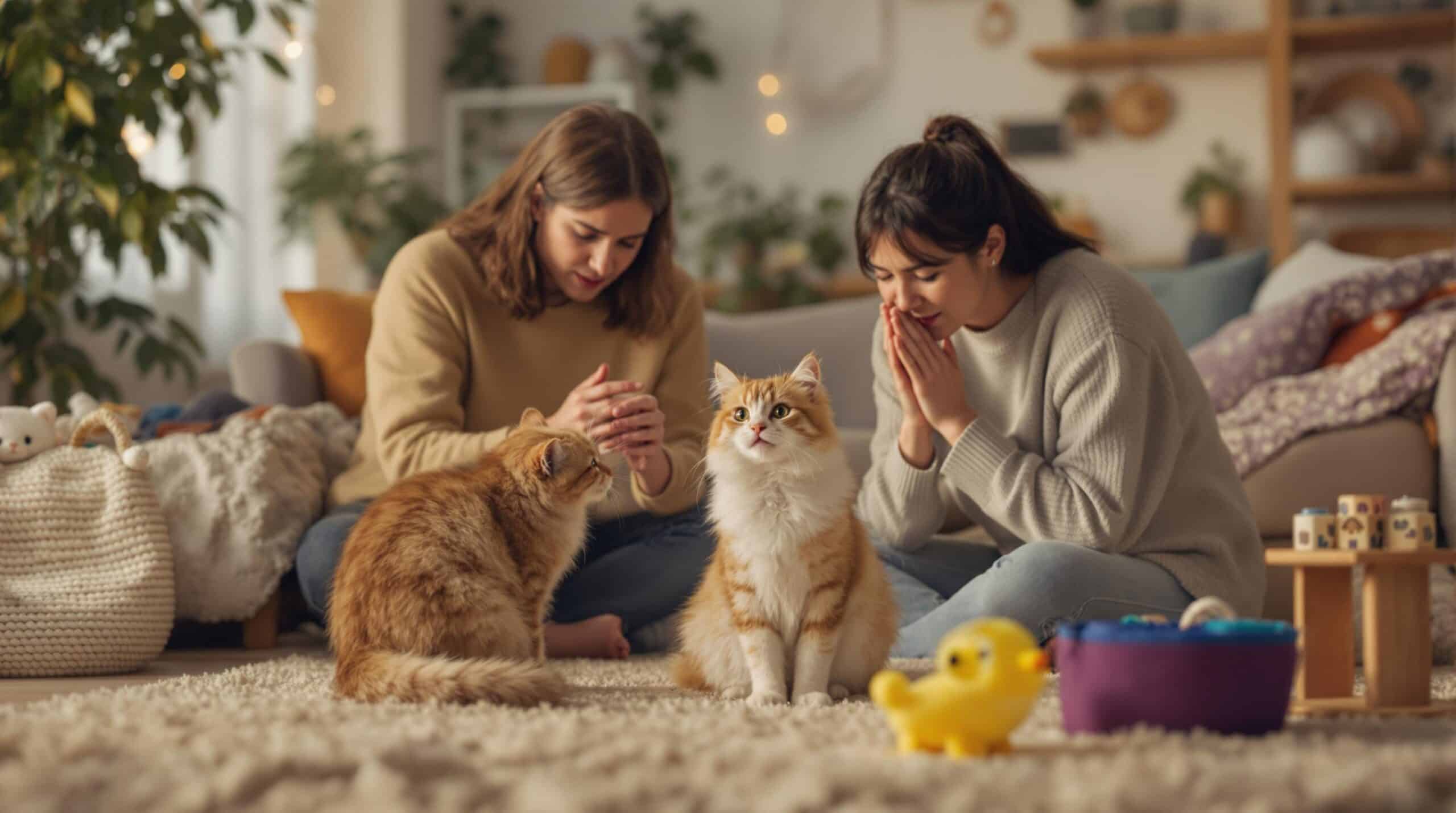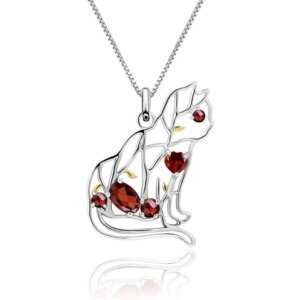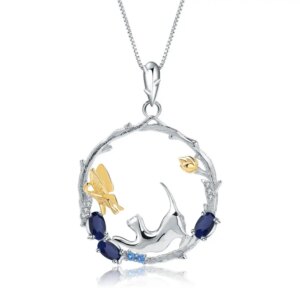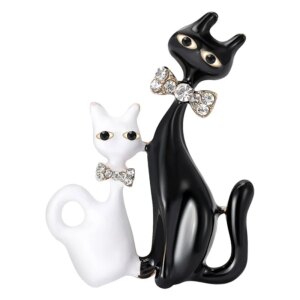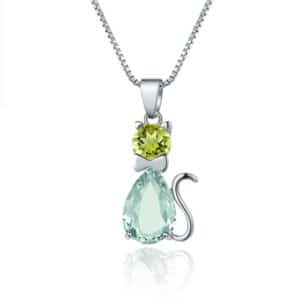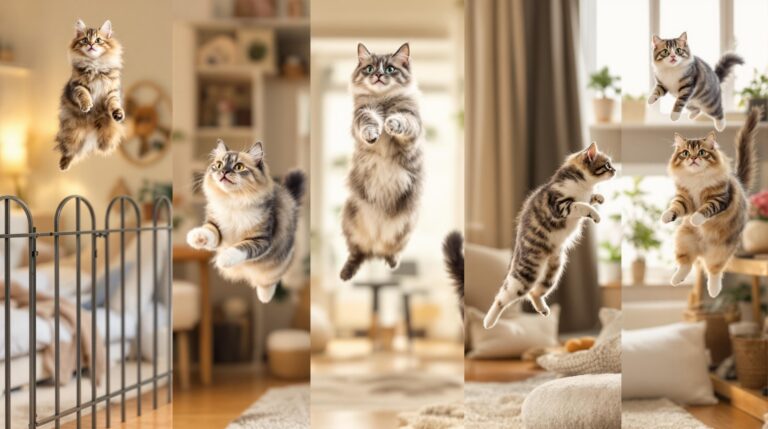Cats having diarrhea can be a concerning issue for pet owners. This article will explore the common causes, symptoms, and treatments for cat diarrhea, as well as provide tips on prevention and when to seek veterinary care. By understanding these aspects, we can ensure your cat remains healthy and comfortable.
At Cat Karma Creations, we understand the importance of a healthy and happy pet. Our range of cat-themed jewelry and gifts, inspired by love and happiness, can add a touch of joy to your life and your cat’s. Whether you’re looking for a beautiful sterling silver cat pendant or a charming cat brooch, we have something for every cat lover. Visit our website to explore our diverse collection.
Common Causes of Cats Having Diarrhea
Dietary Indiscretion
Dietary indiscretion is a common cause of cats having diarrhea. This occurs when a cat eats food that is not part of its regular diet, such as table scraps or non-food items. These unfamiliar foods can irritate the digestive system, leading to loose stools and other gastrointestinal issues. To prevent dietary indiscretion, it’s essential to maintain a consistent diet and avoid feeding your cat human food or other items that could upset its stomach.
Some common foods that can cause cats having diarrhea include dairy products, fatty foods, and spicy foods. If you suspect dietary indiscretion, try fasting your cat for 12-24 hours to give its digestive system a break. After the fast, introduce a bland diet of boiled chicken and rice to help settle the stomach. For more tips and updates, follow us on Facebook or Instagram.
Parasites
Parasites are another significant cause of cats having diarrhea. Common parasites that can affect cats include intestinal worms, such as roundworms, hookworms, and tapeworms. These parasites can cause a range of symptoms, including weight loss, bloating, and loose stools. Regular deworming is crucial to prevent infestations and maintain your cat’s health.
Some signs that your cat may have parasites include visible worms in the stool, a pot-bellied appearance, and a dull coat. If you suspect your cat has parasites, consult a veterinarian for deworming medications and other treatment options. Additionally, maintaining a clean living environment and practicing good hygiene can help reduce the risk of parasite infestations. For more information, visit our website.
Infections
Infections can also cause cats having diarrhea. Viral, bacterial, and fungal infections can all affect the digestive system and lead to loose stools, vomiting, and other symptoms. Common infections that can cause cats having diarrhea include feline panleukopenia, feline leukemia, and feline immunodeficiency virus (FIV). These infections can be serious and require prompt veterinary care.
If your cat shows signs of an infection, such as fever, lethargy, or loss of appetite, it’s important to seek veterinary care immediately. Your vet may perform tests to diagnose the infection and prescribe appropriate treatments, such as antibiotics or antivirals. Regular vaccinations and maintaining good hygiene can help prevent infections and reduce the risk of cats having diarrhea.
Stress
Stress is a lesser-known but significant cause of cats having diarrhea. Cats can experience stress from various factors, including changes in their environment, routine, or social dynamics. Common stressors for cats include moving to a new home, the introduction of a new pet or family member, and loud noises. Stress can cause changes in a cat’s behavior and lead to gastrointestinal issues, including loose stools and vomiting.
To reduce stress in your cat, provide a stable and predictable environment. Create a safe space where your cat can retreat when feeling anxious, and maintain a consistent routine for feeding, playtime, and other activities. If your cat’s stress levels are high, consider using calming aids, such as pheromone diffusers or natural supplements, to help soothe its nerves. For more tips on managing stress, follow us on Pinterest.
Symptoms of Cats Having Diarrhea
Loose Stools
Loose stools are the most obvious symptom of cats having diarrhea. If your cat is having frequent, watery bowel movements, it may be suffering from diarrhea. Loose stools can vary in consistency, from slightly soft to completely liquid. It’s important to monitor the frequency and appearance of your cat’s stools to determine the severity of the issue.
If your cat has loose stools, pay attention to other symptoms, such as changes in behavior, appetite, or energy levels. Keep a record of your cat’s bowel movements and any other symptoms to share with your veterinarian. This information can help your vet diagnose the underlying cause of the diarrhea and recommend appropriate treatment. For more information, visit our website.
Vomiting
Vomiting is another common symptom of cats having diarrhea. Cats may vomit due to various reasons, including dietary indiscretion, parasites, infections, or stress. If your cat is vomiting and has loose stools, it may indicate a more serious underlying health issue. Vomiting can also lead to dehydration, which can worsen your cat’s condition.
If your cat is vomiting and has diarrhea, it’s essential to keep it hydrated. Offer small amounts of water or a rehydration solution, such as Pedialyte, to help replenish fluids. If the vomiting persists or your cat shows signs of dehydration, such as dry gums or sunken eyes, seek veterinary care immediately. For more tips, follow us on Twitter.
Blood in Stools
Blood in the stools is a concerning symptom of cats having diarrhea. If you notice blood in your cat’s stool, it may indicate an infection, inflammation, or injury to the digestive tract. Blood can appear as bright red streaks or dark, tarry stools, depending on the location and severity of the issue.
If your cat has blood in its stool, it’s important to consult a veterinarian as soon as possible. Your vet may perform tests, such as a fecal exam, blood work, or imaging studies, to determine the cause of the bleeding. Treatment options may include medications, dietary changes, or other interventions to address the underlying issue and prevent further complications. For more information, visit our website.
Dehydration
Dehydration is a serious risk for cats having diarrhea. Diarrhea can lead to fluid loss, which can cause dehydration and other health issues. Signs of dehydration in cats include dry gums, sunken eyes, and reduced skin elasticity. If your cat shows signs of dehydration, it’s essential to provide fluids and seek veterinary care.
To help prevent dehydration, encourage your cat to drink water or a rehydration solution. You can also offer wet food, which has a higher water content than dry food, to help keep your cat hydrated. If your cat is severely dehydrated, your vet may administer fluids intravenously to quickly replenish fluids and electrolytes. For more tips, visit our website.
Treating Cats Having Diarrhea
Home Remedies
There are several home remedies that can help treat cats having diarrhea. Fasting is a common first step, as it allows the digestive system to rest and recover. After a 12-24 hour fast, introduce a bland diet of boiled chicken and rice to help settle the stomach. This diet is easy to digest and can help reduce inflammation in the digestive tract.
Other home remedies for cats having diarrhea include probiotics, which can help restore the balance of good bacteria in the gut, and pumpkin, which can help firm up stools. You can also try adding a small amount of psyllium husk to your cat’s food to provide fiber and help regulate bowel movements. If your cat’s diarrhea persists or worsens, it’s important to seek veterinary care for further treatment. For more tips, visit our website.
Medications
Medications can be effective in treating cats having diarrhea, especially if the underlying cause is an infection or parasites. Your veterinarian may prescribe antibiotics to treat bacterial infections, antiparasitic medications to eliminate parasites, or anti-inflammatory drugs to reduce inflammation in the digestive tract. In some cases, your vet may also recommend anti-diarrheal medications to help firm up stools and reduce the frequency of bowel movements.
It’s important to follow your vet’s instructions when administering medications to your cat. Do not give your cat over-the-counter medications without consulting a veterinarian, as some human medications can be toxic to cats. If your cat’s condition does not improve with medication or if it shows signs of worsening, contact your vet for further evaluation and treatment. For more information, visit our website.
Veterinary Care
In some cases, cats having diarrhea may require professional veterinary care. If your cat’s diarrhea persists for more than 24-48 hours, or if it shows signs of dehydration, vomiting, or blood in the stool, it’s important to seek veterinary care. Your vet may perform a physical exam, fecal exam, and other diagnostic tests to determine the underlying cause of the diarrhea and recommend appropriate treatment.
Your vet may also recommend hospitalization for severe cases of cats having diarrhea, especially if your cat is dehydrated or showing signs of other health issues. Hospitalization can provide your cat with the necessary medical care, fluids, and monitoring to help it recover and prevent further complications. Follow your vet’s advice and recommendations to ensure your cat receives the best possible care. For more information, visit our website.
Preventing Cats Having Diarrhea
Consistent Diet
Maintaining a consistent diet is one of the best ways to prevent cats having diarrhea. Sudden changes in diet can upset your cat’s digestive system and lead to loose stools. When introducing a new food, do so gradually over a period of 7-10 days to allow your cat’s digestive system to adjust. Stick to high-quality, nutritionally balanced cat food and avoid feeding your cat human food or other items that could cause gastrointestinal issues.
Some foods that can cause cats having diarrhea include dairy products, fatty foods, and spicy foods. If your cat has a sensitive stomach or a history of digestive issues, consider feeding a hypoallergenic or sensitive stomach formula. These diets are designed to be easily digestible and less likely to cause gastrointestinal upset. For more tips, visit our website.
Regular Deworming
Regular deworming is essential for preventing cats having diarrhea caused by parasites. Parasites can cause a range of symptoms, including weight loss, bloating, and loose stools. Your veterinarian can recommend a deworming schedule based on your cat’s age, lifestyle, and risk factors. Deworming medications are available in various forms, including tablets, liquids, and spot-on treatments, and can be administered at home or by your vet.
In addition to deworming, maintaining a clean living environment can help prevent parasite infestations. Regularly clean your cat’s litter box and vacuum your home to remove any eggs or larvae. If your cat goes outside, consider using a flea and tick prevention product to reduce the risk of external parasites that can carry internal parasites. For more information, visit our website.
Stress Management
Managing stress is crucial for preventing cats having diarrhea. Cats can experience stress from various factors, including changes in their environment, routine, or social dynamics. To reduce stress in your cat, provide a stable and predictable environment. Create a safe space where your cat can retreat when feeling anxious, and maintain a consistent routine for feeding, playtime, and other activities.
If your cat’s stress levels are high, consider using calming aids, such as pheromone diffusers or natural supplements, to help soothe its nerves. You can also try interactive play sessions and environmental enrichment activities, such as puzzle toys and scratching posts, to provide mental and physical stimulation. If your cat’s stress levels do not improve with these strategies, consult a veterinarian or a certified animal behaviorist for additional support. For more tips, follow us on Facebook or Instagram.
Popular Quote
“A cat has absolute emotional honesty; human beings, for one reason or another, may hide their feelings, but a cat does not.” – Ernest Hemingway
Statistical Fact
According to the American Veterinary Medical Association (AVMA), approximately 30% of cats will experience gastrointestinal issues at some point in their lives. This statistic underscores the importance of understanding and managing cats having diarrhea to ensure their health and well-being. (Source: AVMA, 2021)
Three Tips for Managing Cats Having Diarrhea
1. Maintain a Consistent Diet
A consistent diet is crucial for preventing cats having diarrhea. Avoid sudden changes in your cat’s food and stick to high-quality, nutritionally balanced cat food. Gradually introduce new foods over 7-10 days to allow your cat’s digestive system to adjust.
2. Practice Good Hygiene
Regularly clean your cat’s litter box and vacuum your home to reduce the risk of parasite infestations. If your cat goes outside, use flea and tick prevention products to protect against external parasites that can carry internal parasites.
3. Monitor Your Cat’s Behavior
Pay attention to changes in your cat’s behavior, such as increased anxiety or lethargy, which can be signs of stress. Provide a safe and stable environment, and consider using calming aids to help soothe your cat’s nerves.
Popular Questions About Cats Having Diarrhea
1. What are the most common causes of cats having diarrhea?
The most common causes of cats having diarrhea include dietary indiscretion, parasites, infections, and stress. Understanding these causes can help you take preventive measures and seek appropriate treatment.
2. How can I tell if my cat is dehydrated?
Signs of dehydration in cats include dry gums, sunken eyes, and reduced skin elasticity. If you suspect your cat is dehydrated, offer small amounts of water or a rehydration solution and seek veterinary care if symptoms persist.
3. When should I take my cat to the vet for diarrhea?
If your cat’s diarrhea persists for more than 24-48 hours, or if it shows signs of dehydration, vomiting, or blood in the stool, it’s important to seek veterinary care. Your vet can perform diagnostic tests and recommend appropriate treatment.
Final Thoughts About Cats Having Diarrhea
Managing cats having diarrhea involves understanding its causes, recognizing symptoms, and taking appropriate actions. By following the tips and advice provided in this article, you can help your cat recover and prevent future episodes. If your cat’s condition persists or worsens, consult a veterinarian for professional guidance. Visit our website to find excellent gifts for cat lovers and follow us on social media for more tips and updates. If you have any questions or need further assistance, feel free to contact us at (800) 343-1604 or info@catkarmacreations.com.

